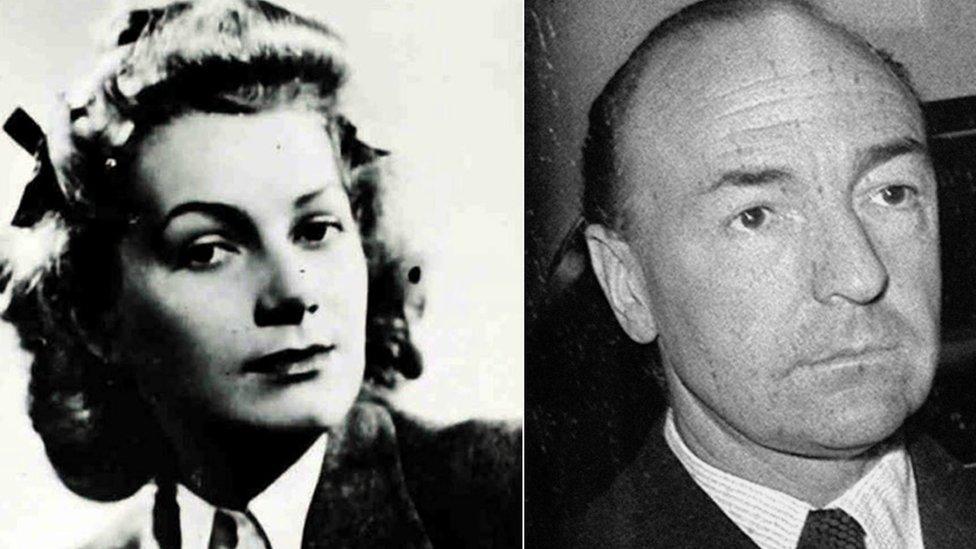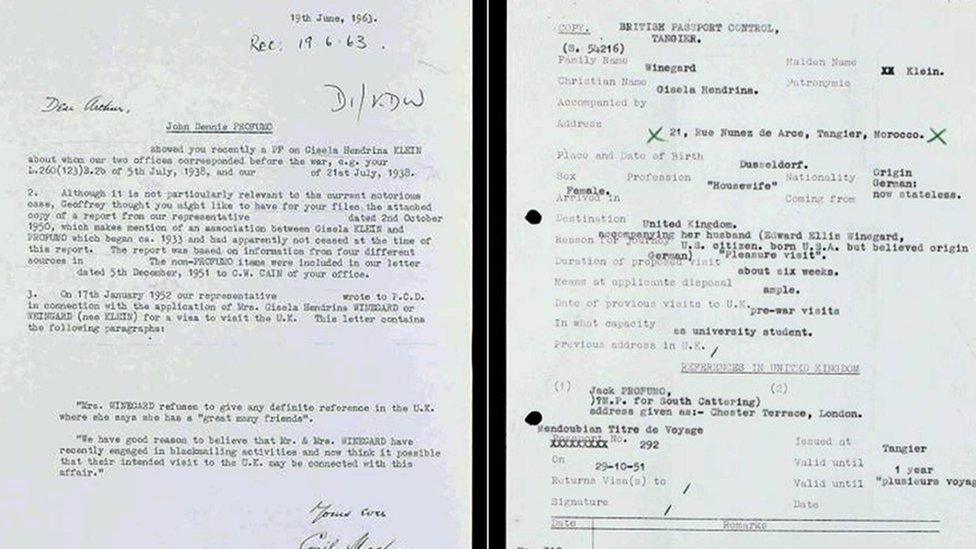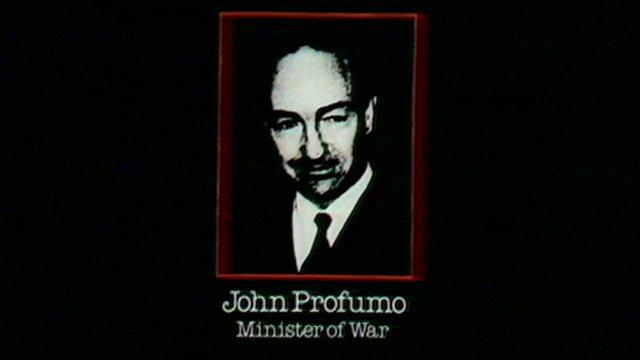John Profumo 'had relationship with Nazi spy'
- Published

Gisela Winegard and John Profumo met in Oxford in the 1930s, before she started working for German intelligence
Tory minister John Profumo - who resigned over a notorious 1960s sex scandal - had a relationship with a Nazi spy, declassified records suggest.
MI5 documents suggest he had a relationship with German model Gisela Winegard in Oxford in the early 1930s.
Dr Stephen Twigge from the National Archives said this could have exposed him to blackmail.
In 1963 Profumo resigned as a minister after it was revealed he lied to MPs about his affair with Christine Keeler.
The declassified papers - published on Tuesday - were compiled by MI6, the UK's foreign intelligence service, and then given to MI5, the domestic branch of the secret services, at the height of the so-called Profumo Affair.
In the letters, Winegard's American husband Edward - who was her jailer when she was convicted of espionage - claimed that the couple separated in 1950 because of her "endearing letters from John Denis Profumo... written on House of Commons notepaper".
Secret Service papers state Profumo wrote to Winegard while he was an MP.

What was the Profumo affair?
A brief explanation of the complexities of the Profumo affair
In the early 1960s John Profumo, then the Conservative secretary of state for war, had a two-year affair with model Christine Keeler, who was also having a relationship with Russian military attache Yevgeny Ivanov.
In March 1963 he told the House of Commons there was no "impropriety" in their relationship after being asked about it by opposition MPs who said they were concerned about the national security implications.
However, more newspaper stories emerged and Profumo eventually admitted lying to the House, resigning from the cabinet and the Commons, and devoting the rest of his life to charity work.
His fall from grace is often considered a contributory factor to the fall of the MacMillan government. Labour would win under Harold Wilson's leadership in 1964.

The documents claim that the fashion model - whose maiden name was Klein - worked for German intelligence during World War Two.
Profumo, who was MP for Kettering from 1940 to 1945 and then for Stratford-upon-Avon, told MI5 about the spy in a memo in 1941, where he admitted to meeting her in 1936 "and got to know her well".
"Lady Astor is alleged to have expressed the opinion that she was a spy," he added.

MI5 documents unveil the extent of the Secret Service's probe in to John Profumo's life at the height of the 1963 sex scandal
The file adds that Winegard was rejected for a UK visa in 1951 as it was thought she had "recently engaged in blackmail activities".
"Jack Profumo, MP for South Cattering [sic]" was named as a reference on the visa.
MI6 head 'alarmed'
Dr Stephen Twigge, head of the Modern Collections section at the National Archive said Profumo "sounded like he was vulnerable to blackmail."
"He wrote to Gisela Winegard in Tangiers and her husband found letters from Profumo on House of Commons note paper in their apartment."
Dr Steven Twigge of the National Archives discusses Profumo's affairs
"It was enough for the MI6 head of station in Tangiers to be alarmed."
However a historian who has written on the case challenged the idea that Profumo could have been blackmailed.
Richard Davenport-Hines, author of "An English Affair: Sex, Class and Power in the Age of Profumo, external" said: "Profumo was a man of the world, rich, handsome and charismatic, who was very open about his sex life.
"As a junior backbencher, he would not have been a security risk in the 1950s.
"He was also a single man when this happened."
Winegard was imprisoned for espionage after the Allies liberated Paris in 1944, marrying Edward on her release in 1950.
She had run a secret information service for German intelligence in Paris under the guise of a "commercial information bureau".
She was also the mistress of a high-ranking German officer, having a child with him.
After the war she came to the attention of the US Secret Service and was accused of harbouring the on-the-run chief of a German spy ring while living in the south of France.
The records also show she was sacked from the Voice of America radio station in Tangier in 1950 when her "pro-German sympathies" were revealed.
- Published19 December 2014

- Published19 December 2014
